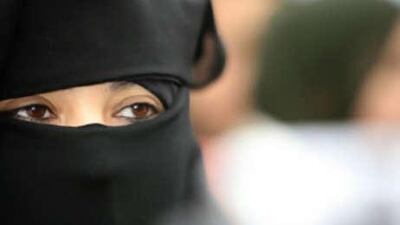PARIS // A deeply religious Moroccan woman has been denied citizenship because her radical practice of Islam has been judged by the highest court in the land to be incompatible with French values.
The judgment by the conseil d'état (council of state) highlights France's chronic difficulty in coming to terms with Europe's largest Muslim population - five million on conservative estimates, though no official figures are published. The 32-year-old mother-of-three, identified in news reports as Faiza Mabchour, is the first person to be refused the right to become French on the grounds of cultural behaviour.
Ms Mabchour's husband is a French national, their three children were all born in France and she speaks good French. Despite having lived in France for eight years, she was deemed by the council to pursue religious practices at odds with "the essential values of the French community, particularly the principle of equality of the sexes". In the past, threats to national security - namely when a radical Muslim is suspected of involvement in, or supporting, terrorist activity - have been cited as the principal grounds for denying citizenship.
But in the case of Ms Mabchour, who lives in the southern suburbs of Paris, social service officials filed reports stating that she lived in a state of "total submission" to her husband and other male relatives including her father and brother-in-law. She also wears a black burqa when out in public. Her original application for French nationality was dismissed in 2005 because she had "failed to assimilate". In her appeal to the council, which has the final say short of presidential decree on disputes between individuals and public administration, Ms Mabchour insisted that she had "never sought to call into question the fundamental values of the republic".
She accepted that she did not habitually appear veiled when living in Morocco but had worn the burqa since arriving in France at the request of her husband, "more out of habit than any conviction". But, in its controversial ruling, the court stated: "She has no idea about the secular state or the right to vote. She lives in total submission to her male relatives. She seems to find this normal and the idea of challenging it has never crossed her mind."
Emmanuelle Prada-Bordenave, the government representative responsible for giving a judicial opinion of the case, said she had based her recommendations on interviews with the woman, her husband, police and social services. Mrs Prada-Bordenave said Ms Mabchour had presented herself at these interviews "covered with women's clothing from the Arabic peninsula, a long dress falling to her feet and a veil masking her hair, her forehead and her chin and a piece of fabric masking the face with only the eyes showing through a slit". The couple had "readily" acknowledged their practice of Salafism, which requires a rigorous interpretation of the Quran.
"From her own declarations she lives an almost reclusive life, cut off from French society," Mrs Prada-Bordenave said. "She has no idea of secularism or the right to vote. She lives in total submission to the men in her family. She appears to find that normal." Freedom of religion is guaranteed by the French constitution, but some in France claim that other fundamental rights are threatened by the way of life adopted by some Muslims.
Even so, commentators have given a mixed reaction to the the council's ruling. The left-of-centre newspaper Le Monde, which first reported the decision, emphasised Ms Mabchour's command of French, held in the past to be a sign of assimilation, and the fact that she was seen by a male gynaecologist during her pregnancies. However, in an editorial posing the question, "Is the burqa incompatible with French citizenship?", the paper found the ruling hard to fault.
But Danièle Lochak, a law professor, said: "Followed to its logical conclusion, it means that women whose partners beat them are also not worthy of being French." The ruling will do nothing to soothe tensions between France's Muslim community and the authorities. Relations have faced a series of tests, including the ban on headscarves and other religious symbols in state schools in 2004 which sparked heated debate over freedom and equality within the secular republic.
The French government adheres to the theory that all French citizens are equal before the republic, and religion or ethnic background are matters for the private sphere. But, in practice, human rights groups say, society is plagued by discrimination. The French president, Nicolas Sarkozy, has stressed the importance of "integration" into French life. Among his stricter control of immigration is a law that requires foreigners who want to join their families to sit an exam on French language and values before leaving their countries.
* The National

